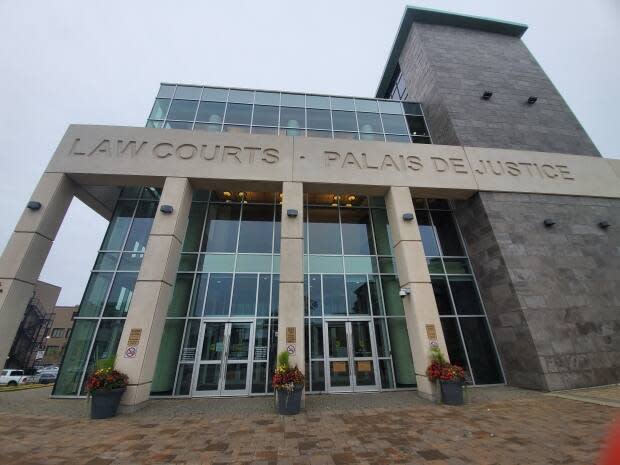Guidelines shed light on how hearings will be conducted as courthouses reopen
The Court of Queen's Bench has set dates and finalized rules for court to resume in person, but the process of trials and testimony will look quite different.
Jury trials are beginning Aug. 15, and everything scheduled for June 1 onwards will resume in-person starting at that date.
There have been very few in-person appearances since the province called a state of emergency because of COVID-19. But as cases restart, physical distancing is one of the biggest concerns.
There will be signs posted to indicate where people can and can't sit in a particular courtroom. Indicators on the floor will show which direction people should travel in hallways and stairwells, and overflow rooms will be set up for cases that have more public interest.
But how is it possible to have a jury trial with adequate physical distancing? This is one of the first questions that came to defence lawyer Gilles Lemieux's mind.
"I'm trying to imagine what physical distancing might look like in the jury box.," he said. "If you put them six feet apart, the jury box will certainly double, possibly triple in size."

This is why in some cases, like in Fredericton, jury trials will have to happen in another building. Last week the province announced that the Court of Queen's Bench in Fredericton will move all its matters to the Fredericton Convention Centre.
"The decision is meant to accommodate spacing requirements to hold jury selections and jury trials," said a provincial news release.
Fredericton provincial court matters will remain in the courthouse on Queen Street.
A guideline document written by Court of Queen's Bench Chief Justice Tracey DeWare said each courtroom will have an assigned maximum number of people, and the number includes the judge, stenographer, sheriffs, lawyers and accused.
"Priority will be given to parties and their counsel," the guidelines said.
Before an in-person hearing, lawyers and the judge will discuss by phone who's going to be appearing, the guidelines said. Lawyers also have to give the presiding judge a list of people who may be in the courtroom. If someone is deemed non-essential, they could be barred from attending in person.
Masks and sharing documents?
Witnesses will not be allowed to testify while wearing a face mask, the guidelines said.
"Face shields will be made available for any witness who feels uncomfortable removing their face mask during their testimony," the guidelines say.
This provision does not apply to religious face coverings.
Lemieux said there could be several reasons for not allowing witnesses to wear masks.
The fact that you you have to take new steps to handle exhibits, for example, does that mean you'll handle them less? - Gilles Lemieux, criminal defence lawyer
He said when he cross-examines a witness, it's very important to see how they react to certain questions, and he can't do that if he can't see their full face.
"We watch very carefully the reaction of people as the answer our questions," he said. "Eye contact, and the way they speak."
The other reason could be a recording issue.
"Will a mask muffle the voice?" he said. "Will that affect the recording? Will that affect the quality of the transcripts if it's needed?"
Lawyers, judges and other participants will have to disinfect their hands every time they touch a shared exhibit. Lemieux says he doesn't know what repercussions this might have on behaviour in the courtroom.
"The fact that you you have to take new steps to handle exhibits, for example, does that mean you'll handle them less?" he said. "I don't know."
What if a witness needs to travel?
Witnesses coming from outside the province to testify have to follow provincial guidelines of self–isolating for two weeks before appearing in court. But they can appear by video conference instead if the judge allows, the guidelines said.
Appearances will also be staggered. Instead of 9 a.m. and 1:30 p.m., Court will commence at various times between 9:00 a.m. and 10:00 a.m. and 1:00 p.m. and 2:00 p.m.
There could also be more people appearing remotely, if the judge approves.
Personal concern
The guidelines say anyone experiencing symptoms must notify the clerk and stay away from the courtroom.
Lemieux said another thing he's keeping in mind is his own safety.
"I'm in my mid–60s so I'm going to be concerned for myself," he said.
But Lemieux said it's important for courts to start operating again for everyone's benefit, including the public's.
"The justice system got thrown in the deep end of the pool and they said 'swim,'" he said.

